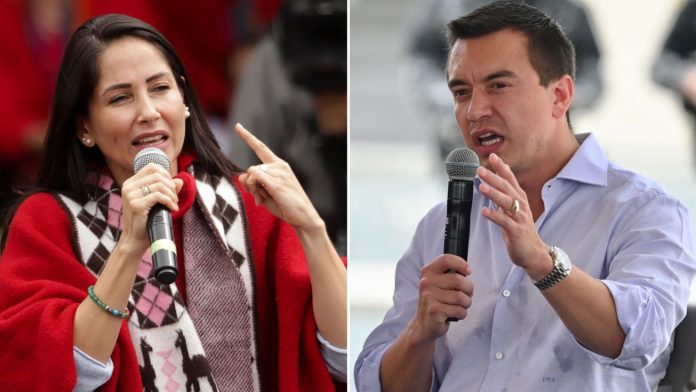As Ecuador heads into a crucial runoff election today, fears are rising that the country could become a narco-state. The election pits current President Daniel Noboa, a conservative ally of former US President Donald Trump, against left-wing challenger Luisa González, who has strong ties to the Venezuelan government of Nicolás Maduro.
Noboa has been a vocal critic of Maduro and refused to recognise him as Venezuela’s legitimate president after the disputed 2024 election. He has focused his presidency on combating organised crime and violent gangs. Noboa is committed to using all available resources to restore peace and security in Ecuador. The country is currently grappling with high levels of violence.
González’s left-wing election strategy
González, aligned with former President Rafael Correa, aims to strengthen ties with other left-leaning Latin American governments. She would likely deepen Ecuador’s connections with leaders such as Brazil’s Luiz Inácio Lula da Silva, Colombia’s Gustavo Petro, and Gabriel Boric of Chile. If elected, she could steer Ecuador back to Correa’s left-wing policies, particularly regarding security and crime.
Joseph Humire, Executive Director of the Centre for a Secure Free Society, noted that President Noboa has made security his top priority. “Despite his efforts, the situation has only improved marginally, and Ecuador faces other serious challenges,” Humire said.
The debate over crime policy
González calls for a larger military role in fighting gang violence, but she also stresses the importance of avoiding excessive force and protecting human rights.
Mathias Valdez Duffau, a visiting fellow at Argentina’s Catholic University, said González might seek to negotiate with criminal organisations instead of directly confronting them. “Her stance on crime is less aggressive than Noboa’s,” Valdez Duffau explained. “She might favour dialogue with drug cartels rather than pursuing them relentlessly.”
This approach mirrors Correa’s administration, which aimed to integrate gangs into society through broader government efforts. Valdez Duffau warned that negotiating with gangs could strengthen them. “In the long run, this strategy could lead to gangs co-opting government officials, turning Ecuador into a narco-state,” he cautioned.
Ecuador’s ongoing struggles with violence during the election campaign
Violence remains a top concern for voters. Ecuador has the highest murder rate in Latin America, with 6,986 homicides in 2024. This made it the second deadliest year on record. Thousands have fled the country as rival gangs fight for control of territory.
In response, Noboa declared an internal armed conflict in 2024. He authorised military operations to dismantle transnational criminal networks and deployed more troops to prisons and high-risk areas. Noboa has also called for international support, suggesting the US military could assist Ecuador in tackling gangs.
Despite these efforts, January 2025 was Ecuador’s deadliest month, with 781 people killed. Noboa has also partnered with Erik Prince, founder of Blackwater, to fight narcoterrorism.
According to InSight Crime, Ecuador has become a major hub for drug trafficking, particularly cocaine from Peru and Colombia. These criminal networks have infiltrated Ecuador’s prisons and formed alliances with local gangs. Some of these groups work with international cartels, including the powerful Sinaloa Cartel.
A divided nation faces an uncertain future
Noboa and González each received around 44% of the vote in the first round of the election. González, the leader of the Citizen Revolution movement, is seeking to become Ecuador’s first female president. If she wins, the country could return to the left-wing economic policies of Correa’s presidency.
Whoever wins will have to manage a divided National Assembly. This will make it harder to pass necessary reforms to address the country’s violence and economic struggles.
Former Tungurahua Governor Saúl Medina told Fox News Digital that after the election, Ecuador must adopt a comprehensive strategy to combat gang violence. “The focus must be on strengthening institutions, improving police oversight, and reforming prisons,” Medina said. “Prisons must no longer be the operational centres for criminal gangs.”
Experts agree that Noboa’s pro-Trump stance puts him in a good position to address Ecuador’s violence. Should he win, his hardline approach to crime could give him the tools to stabilise the country.
